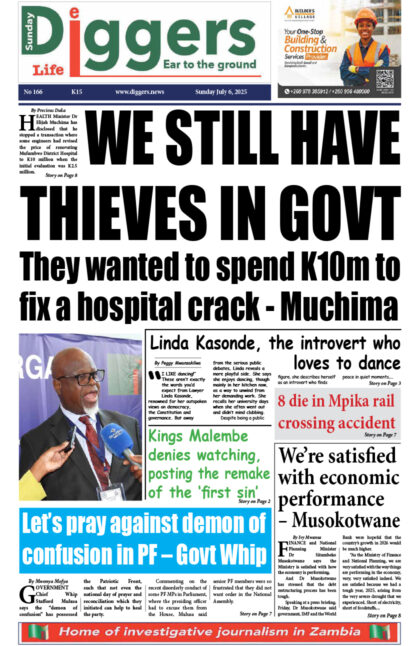FORMER finance minister Ng’andu Magande says Zambia’s debt will be difficult to write-off because most of it was borrowed from the “streets”.
And Liuwa UPND member of parliament Situmbeko Musokotwane says writing-off Zambia’s debt would be a challenge as several of Zambia’s creditors are profit-making entities.
In an interview, Magande argued that writing-off Zambia’s debt would be difficult because government borrowed from the capital markets rather than financial aid institutions, such as the World Bank, which would have been easier to negotiate with.
“I have never negotiated for people to write-off debts; I have negotiated for government and practical institutions to write-off debt so. I did not go to hunt for people to help me because the World Bank is one of the banks that government owns so, I just went straight there because that is a government institution. The African Development Bank (AfDB) is a government institution, some of the people working there are even Zambians. Now, this debt, the government went to borrow in the streets; we call this is open capital markets. They went to borrow money from people they don’t know so I don’t know how they are going to negotiate? I don’t know how they handling the matter,” said Magande.
“The debt that Zambia had when I was Minister, most of it was from institutions that you owned. The debt that is here, now, is from private people who are not known; it is from the capital markets. So, there is a big difference between the two of them; you are negotiating with institutions that are yours. It’s like government having borrowed money from Zesco, they would know who the MD is. But when government goes to borrow from somebody in the streets, they go and engage you as a private person to say, ‘go and look for people who have money and you tell them I found 20 people who want to lend you 20 billion and they get that money…’ they obviously have to renegotiate with those people.”
And in a separate interview, Musokotwane said the people whom Zambia owed expected their money back.
“It will be hard for people to write-off debt. Remember, those debts are a way of them doing business. In other words, everyone who lends money to Zambia does so because they where doing it for business. So, they expect to earn something from that money in the name of interest, which we normally call it. On top of that, they expect to get their money back on the capital they provided. So, it will not be an easy thing to make everyone agree that, ‘we lent you US $100, now you can pay us only US $60′, it will not be easy. But if they push hard, and more importantly, if government can demonstrate that they have put measures that gives hope for the future,” Musokotwane said.
“Some of those people, who lend money to Zambia, especially the Government of China, through its institutions, has lent quite a bit of money to Zambia. The Chinese government’s mindful that they have to maintain a relationship between Zambia and itself, and also given the amount of pressure that the Chinese government is receiving from the international community to do something about the debt crisis that has raided Africa. It may be possible that the Chinese government may do something about reducing the debt.”
Musokotwane cautioned that pushing for debt write-offs from local commercial creditors, like banks, might cripple their operations.
“For the local banks, we have to be careful, including institutions like NAPSA, because if you say, ‘Absa Zambia, Zanaco, we owe you K100 million, but we are going to pay K60 million, write-off the K40 million…forget about it, you will never be paid.’ If we do that, then we are also shooting ourselves in the foot because the money these local institutions lent to our government is money that’s deposited there by Zambian depositors,” said Musokotwane.
“So, if we say, ‘we are not going to pay back’ that is another way of saying to the bank that, ‘when your depositors come and ask for the money, you will not be able to pay them back because we have not paid you back.’ So, we must be very careful in the manner we treat the local banks because we don’t want to bankrupt them because of our borrowed state. It also means that the same banks’ ability to lend, since you have depleted them of resources, their ability to lend to local businesses will shrink because you have not paid them.”




















3 responses
The Brian’s have spoken…
What is so sad is the people who put us in this mess are quiet pretending to be innocent. Alexandra Chikwanda, Miles Sampa, Bwalya Ngandu and your friends, what were you thinking when you went to negotiate these bad debt deals? How do we dig ourselves out of this mess while giving our Gold to foreigners?
But why shall any country, institution, financier write off debt of Zambia. Let politicians who mismanaged borrowed to pay themselves salaries, allowances and steal be taken to courts to pay.